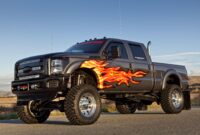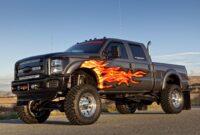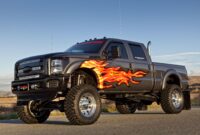Beyond the Rental: A Comprehensive Guide to Buying a Used U-Haul Truck cars.truckstrend.com
In the world of moving, logistics, and transportation, U-Haul is a household name, synonymous with accessible and affordable rentals. However, what many don’t realize is that U-Haul also offers a robust program for selling its retired fleet vehicles. For businesses needing reliable transport, individuals embarking on frequent large-scale projects, or even those looking for a versatile utility vehicle, buying a used U-Haul truck can be a surprisingly smart and cost-effective decision. This comprehensive guide will delve into every aspect of purchasing a U-Haul truck, from understanding the inventory to navigating the buying process, ensuring you make an informed choice.
Why Buy a Used U-Haul Truck? Unpacking the Advantages
Beyond the Rental: A Comprehensive Guide to Buying a Used U-Haul Truck
The decision to purchase a used U-Haul truck, rather than continually renting or buying a new commercial vehicle, comes with several compelling benefits:
- Cost-Effectiveness for Frequent Use: If you regularly need a truck for deliveries, hauling equipment, or managing multiple moves, the cumulative cost of rentals can quickly surpass the purchase price of a used vehicle. Owning eliminates recurring rental fees, saving significant money in the long run.
- Reliability Born from Rigorous Maintenance: U-Haul maintains an enormous fleet, and their business model relies on these vehicles being consistently operational. This necessitates a strict, regular maintenance schedule performed by professional mechanics. While U-Haul trucks accrue high mileage, they often come with detailed service histories, indicating a level of care many private vehicles don’t receive.
- Variety of Sizes and Types: From nimble pickup trucks and cargo vans to various sizes of box trucks (10ft, 15ft, 17ft, 20ft, 26ft), U-Haul offers a wide array of options, ensuring you can find a vehicle perfectly suited to your specific needs.
- No Rental Deadlines or Restrictions: Owning means ultimate flexibility. There are no return deadlines, mileage limits, or restrictions on what you can transport (within legal and safe limits). You can customize the interior, add shelving, or brand it as your own.
- Proven Durability: These trucks are built for commercial use and designed to withstand the rigors of constant heavy loads and diverse driving conditions. They are workhorses, engineered for utility and longevity.

Where to Buy a Used U-Haul Truck: Official Channels are Key
When it comes to purchasing a used U-Haul truck, it’s best to stick to official or highly reputable channels to ensure transparency and reliability.
- U-Haul’s Official Sales Website (UHaul.com/TruckSales): This is by far the most direct and recommended avenue. U-Haul maintains a dedicated online portal where they list thousands of vehicles available for sale across the country. You can filter by vehicle type, location, price, and features. Each listing typically includes photos, detailed specifications, and often a vehicle history report.
- Local U-Haul Centers: Many larger U-Haul moving and storage centers also have a selection of trucks available for direct sale on-site. While the online portal is comprehensive, visiting a local center allows for immediate physical inspection and potentially a test drive. It’s always wise to call ahead to confirm their sales inventory.
- U-Haul Auctions (Less Common for Public): Occasionally, U-Haul may liquidate large batches of vehicles through wholesale auctions. These are generally less accessible to the average consumer and more geared towards dealerships or commercial buyers.
- Third-Party Dealerships/Listings: You might find retired U-Haul trucks listed on general used car websites or through independent commercial vehicle dealers. While possible, exercise extreme caution here. Ensure you get a full vehicle history report (CARFAX, AutoCheck) and a professional pre-purchase inspection, as the direct U-Haul channels offer more inherent transparency regarding maintenance history.
Types of U-Haul Trucks Available for Purchase
U-Haul’s fleet is diverse, offering a range of vehicles suitable for different tasks:
- Pickup Trucks: Primarily Ford F-150s, these are excellent for smaller hauling jobs, personal use, or towing. They offer versatility with an open bed.
- Cargo Vans: Models like the Ford Transit, Ram ProMaster, or Nissan NV are ideal for smaller deliveries, tradespeople, or those needing enclosed, secure space without the bulk of a box truck.
- Box Trucks: These are the iconic U-Haul vehicles. They come in various sizes, each suited for different capacities:
- 10-foot Box Trucks: Often Ford E-Series Cutaway or similar, suitable for studio apartments or small moves.
- 15-foot Box Trucks: A popular choice for 1-2 bedroom apartments, offering more space.
- 17-foot Box Trucks: Good for larger apartments or small homes.
- 20-foot Box Trucks: Designed for 2-3 bedroom homes, a significant volume capacity.
- 26-foot Box Trucks: The largest option, perfect for 3-4+ bedroom homes, commercial goods, or heavy-duty hauling. These often require more careful handling due to their size.
- Specialty Vehicles: Less common for direct sale but sometimes available are things like chassis cabs (for custom upfitting) or even older car haulers/tow dollies.
The Buying Process: A Step-by-Step Guide
Purchasing a used U-Haul truck is similar to buying any used vehicle, but with some U-Haul-specific nuances.
- Research and Define Your Needs: Before browsing, determine what you’ll primarily use the truck for. What size do you need? What’s your budget? Do you require specific features like a ramp or tie-downs?
- Browse Inventory: Head to UHaul.com/TruckSales. Use the filters to narrow down your search by location, truck type, and price range. Pay attention to mileage, photos, and the listed features.
- Initial Inquiry & Inspection: Once you find a promising candidate, contact the listed U-Haul center. Arrange a time to inspect the truck in person. This is crucial.
- Exterior: Check for body damage, rust, tire condition (tread depth, uneven wear), and lighting.
- Interior: Look for excessive wear on seats, dashboard, and controls. Test all electronics (lights, radio, AC, windows).
- Under the Hood: Check fluid levels, belts, hoses. Look for leaks or unusual corrosion.
- Cargo Area: Inspect the floor, walls, and ramp for damage or signs of excessive wear.
- Test Drive: This is non-negotiable.
- Listen for unusual noises (engine, transmission, suspension).
- Check braking performance and steering responsiveness.
- Ensure the transmission shifts smoothly through all gears.
- Test cruise control (if equipped).
- Pay attention to how it handles at different speeds.
- Review Maintenance Records/Vehicle History: U-Haul is generally transparent about their fleet maintenance. Ask for records. While they may not provide every oil change receipt, they can often give you an overview of major services. For non-U-Haul direct sales, insist on a CARFAX or AutoCheck report.
- Understand Pricing and Payment: U-Haul lists firm prices. They typically do not negotiate heavily, as their prices are competitive for the market. Be prepared to pay the listed price. They accept various payment methods, including cashier’s checks or wire transfers. Financing options might be available through third-party lenders, but U-Haul itself typically doesn’t offer in-house financing for used vehicles.
- Paperwork and Title Transfer: Once you agree to purchase, U-Haul will handle the necessary sales agreements and title transfer documents. Ensure all VINs match and that the title is clear of any liens.
- Post-Purchase Considerations:
- Insurance: Obtain commercial vehicle insurance if you plan to use it for business. Even for personal use, ensure your auto insurance policy covers the vehicle type and its intended use.
- Registration & Plates: Register the vehicle with your state’s DMV and obtain license plates. Be aware of any commercial vehicle registration requirements if applicable.
- Immediate Maintenance: Even with U-Haul’s maintenance, consider an immediate oil change, fluid checks, and a general tune-up for peace of mind.
Important Considerations Before You Buy
While buying a used U-Haul truck offers many benefits, there are crucial factors to weigh:
- Condition and Mileage: U-Haul trucks are retired with high mileage. Expect significant wear and tear, especially cosmetically. Focus on mechanical soundness over pristine appearance.
- "As-Is" Sale: Most used vehicle sales, including U-Haul’s, are "as-is." This means no warranty is provided, and you are responsible for any repairs after purchase. This underscores the importance of thorough inspection.
- Intended Use and CDL Requirements: For larger box trucks (typically 26-footers), ensure you understand Gross Vehicle Weight Rating (GVWR). If the GVWR exceeds 26,000 lbs, a Commercial Driver’s License (CDL) might be required, depending on your state and intended commercial use. Most U-Haul box trucks are designed to be driven with a regular driver’s license for non-commercial use.
- Operating Costs: Factor in fuel efficiency (which can be poor for large box trucks), insurance premiums, and ongoing maintenance/repair costs.
- Customization: While you can customize it, remember the truck’s history. Some modifications might be challenging due to the existing interior layout.
Pricing Guide: What to Expect
Prices for used U-Haul trucks vary significantly based on vehicle type, year, mileage, condition, and location. The table below provides a general estimation.
| Truck Type | Typical Model | Capacity/Size | Estimated Price Range (USD) | Notes |
|---|---|---|---|---|
| Pickup Truck | Ford F-150 | 1/2 Ton | $8,000 – $18,000 | Versatile, good for light hauling/towing, often higher mileage. |
| Cargo Van | Ford Transit, NV2500 | 100-300 sq ft | $10,000 – $22,000 | Enclosed secure space, good for deliveries/trades, often high mileage. |
| Box Truck | Ford E-Series, GMC | 10-foot (Small) | $7,000 – $15,000 | Good for small moves, tight spaces. |
| Box Truck | Ford E-Series, GMC | 15-foot (Medium) | $9,000 – $18,000 | Popular size, balanced capacity. |
| Box Truck | GMC Savana, Isuzu | 17-foot (Large) | $10,000 – $20,000 | For larger apartments/small homes. |
| Box Truck | Isuzu NPR, GMC | 20-foot (X-Large) | $12,000 – $25,000 | Significant capacity for 2-3 bedroom homes. |
| Box Truck | Isuzu NPR, GMC | 26-foot (Max) | $15,000 – $30,000+ | Largest option, commercial potential, check CDL requirements. |
Note: These are estimated ranges. Actual prices depend heavily on the specific vehicle’s condition, mileage, year, and market demand. Always check current listings on UHaul.com/TruckSales for the most accurate pricing.
Benefits and Potential Challenges
Benefits:
- Significant Cost Savings: Over time, cheaper than renting repeatedly.
- Reliability: Benefit from U-Haul’s professional fleet maintenance.
- Immediate Availability: Large inventory across the country.
- Variety of Options: Find the exact size and type you need.
- No Rental Restrictions: Freedom to use as you please.
Potential Challenges:
- High Mileage: All used U-Haul trucks have substantial mileage, leading to more wear and tear.
- Cosmetic Imperfections: Expect dents, scratches, and worn interiors from rental use.
- "As-Is" Sales: No warranty, so any post-purchase repairs are your responsibility.
- Specific Wear Patterns: Components like ramps, cargo area floors, and doors may show more wear than other parts due to frequent use.
- Limited Negotiation: Prices are generally firm.
Tips for a Successful Purchase
- Be Patient: Don’t rush into a purchase. The U-Haul inventory is vast, and new vehicles are added regularly.
- Thoroughly Inspect: Go beyond a quick look. Spend time checking every detail, both mechanically and cosmetically.
- Consider a Pre-Purchase Inspection (PPI): While U-Haul maintains their fleet, getting an independent mechanic to inspect the truck can provide invaluable peace of mind, especially for larger investments.
- Factor in All Costs: Beyond the purchase price, budget for insurance, registration, potential immediate maintenance, and fuel.
- Understand Your Needs: Don’t buy a 26-foot truck if a 15-footer will suffice. Larger trucks mean higher fuel costs and more challenging maneuverability.
Conclusion: Driving Value Home
Buying a used U-Haul truck can be an incredibly practical and economical solution for individuals and businesses alike. While they come with high mileage and the tell-tale signs of a working life, their consistent maintenance, proven durability, and competitive pricing make them a compelling option. By thoroughly researching, inspecting, and understanding the nuances of these vehicles, you can drive away with a reliable workhorse that serves your needs for years to come, turning a recurring rental expense into a valuable asset.
Frequently Asked Questions (FAQ)
Q1: Are used U-Haul trucks reliable to buy?
A1: Generally, yes. U-Haul has a vested interest in keeping its fleet running, so they undergo regular, professional maintenance. While they have high mileage, this maintenance history often makes them reliable work vehicles.
Q2: Do used U-Haul trucks come with a warranty?
A2: No, almost all used U-Haul trucks are sold "as-is," meaning there is no warranty provided by U-Haul. This makes a thorough pre-purchase inspection critical.
Q3: Can I finance a used U-Haul truck?
A3: U-Haul typically does not offer in-house financing for used truck sales. However, you can secure financing through your bank, credit union, or other third-party lenders, just like with any other used vehicle purchase.
Q4: What kind of mileage do used U-Haul trucks typically have?
A4: Expect high mileage. U-Haul trucks are retired after extensive use, so it’s common to see vehicles with 150,000 to 300,000 miles or more.
Q5: Are U-Haul trucks hard to maintain after purchase?
A5: Not necessarily. Most U-Haul trucks use common Ford, GM, or Isuzu chassis and powertrains, meaning parts are readily available, and most mechanics are familiar with them. Routine maintenance is similar to other vehicles of their class.
Q6: Can I use a purchased U-Haul truck for commercial purposes?
A6: Absolutely! Many businesses purchase retired U-Haul trucks for deliveries, landscaping, construction, or other commercial hauling needs. You will need to ensure you have the appropriate commercial vehicle insurance and registrations for your state.
Q7: Do I need a CDL (Commercial Driver’s License) to drive a purchased U-Haul truck?
A7: For most U-Haul box trucks (up to 26 feet), a standard Class D driver’s license is sufficient for personal use. However, if the truck’s Gross Vehicle Weight Rating (GVWR) exceeds 26,000 pounds, or if you plan to use it for specific commercial purposes (especially interstate commerce), you might need a CDL. Always check your state’s specific Department of Motor Vehicles (DMV) regulations regarding CDL requirements for commercial vehicles. Most U-Haul trucks are designed to be below the CDL threshold for non-commercial use.



